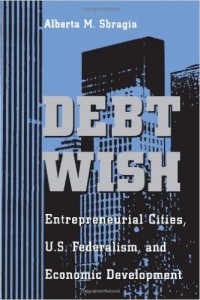Debt Wish 20 Years On: Revisiting Sbragia’s U.S. Entrepreneurial Urbanism
Association of American Geographers Annual Meeting 2016, San Francisco
Organizers: Mark Davidson (Clark University) and Kevin Ward (University of Manchester)
Call for Papers
“Local officials […] have revamped or transformed both the institutions and the processes of investment in order to maximize their autonomy from both the state and the federal governments” (Sbragia, 1996; 10)
It is now 20 years since Alberta Sbragia’s study of American entrepreneurial city government was published. Sbragia’s landmark book, Debt Wish: Entrepreneurial Cities, U.S. Federalism, and Economic Development, gave a detailed account of how city governments, constrained by neoliberal state reforms (Harvey, 1989), managed to create innovative mechanisms that enabled them to continue on as economic development entities. Sbragia’s 1996 account of American Federalism and the role that municipalities came to play in it, emphasized how cities had utilized both public authorities (i.e. legal innovation) and bond markets (i.e. financial innovation) to construct an investor-based model of urban governance in the context of tightening fiscal restrictions.
In the 20 years since the publication of this book, cities across the U.S. have been responsible for a proliferation of new public authorities (Fainstein, 2001) and a massive increase in the size of the municipal bond market (Weber, 2010). The principal components of Sbragia’s analysis therefore remain central to urban governance today. However, since the 2008 financial crisis, the urban governance landscape has been in flux. The rise of austerity politics has created new fiscal challenges for cities (Peck, 2012), the dangers of financial speculation for city governments have been revealed (Davidson and Ward, 2014), and the legal structures that define municipal fiscal failure have been rewritten (Tabb, 2014).
In this session we revisit Debt Wish and consider the book’s continuing relevance for scholars of contemporary urban politics and policy. The session will explore the following issues:
- The continuing role of debt in urban governance
- Recent legal innovations within U.S. urban governance
- Inter-governmental relations and contemporary urban governance
- The influence of financial crisis and recession on contemporary urban governance
- Reflections and critiques on theories of entrepreneurial urban governance
- International comparisons of contemporary urban governance
- Financialization and contemporary urban governance
- Emergence, travels and transformations of U.S urban financial “models”
Please send abstracts of no more than 250 words to Mark Davidson (mdavidson@clarku.edu) and Kevin Ward (kevin.ward@manchester.ac.uk) by the end of October 10.
Information about conference fees, registration and general conference details can be found at: http://www.aag.org/cs/annualmeeting
References
Davidson, M. and Ward, K. (2014) ‘Picking up the pieces’: austerity urbanism, California, and fiscal crisis, Cambridge Journal of Regions, Economy and Society, 7(1): 81-97
Fainstein, S. (2001) The city builders: Property development in New York and London, 1980-2000: Second Edition (Blackwell: Oxford)
Harvey, D. (1989) From Managerialism to Entrepreneurialism: The Transformation in Urban Governance in Late Capitalism, Geografiska Annaler. Series B, Human Geography, 71(1): 3-17
Peck, J. (2012) Austerity urbanism: American cities under extreme economy, City: analysis of urban trends, culture, theory, policy, action, 16(6): 626-655
Sbragia, A. (1996) Debt Wish: Entrepreneurial Cities, U.S. Federalism, and Economic Development. (University of Pittsburgh Press: Pittsburgh)
Tabb, W. (2014) The wider context of austerity urbanism, City: analysis of urban trends, culture, theory, policy, action, 18(2): 87-100
Weber, R. (2010) Selling City Futures: The Financialization of Urban Redevelopment Policy, Economic Geography, 86(3): 251-274

